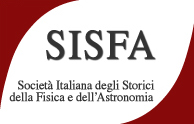Conveners
La Fisica e il Mare: conoscere, navigare, esplorare / Physics and the Sea: Knowing, Sailing, Exploring
- Chairperson: Luca Guzzardi
The Whipple Museum of the History of Science in Cambridge holds a large collection of scientific devices intended to aid navigation at sea. Some of these are very well known—instruments like the sextant and the chronometer, both designed to help navigators calculate their position when out of sight of land. But many of these devices are more obscure. This talk will consider a range of these...
Climate change, starting in the mid-20th century, has been rapid — more so than the scientific community itself had expected — and global. Rapid, global, and synchronous — meaning it has affected every region of the world at the same time, although in different ways. Some regions are considered sentinels of the climate crisis. By this, we mean that they are warming more quickly and intensely...
Among the many scientific interests of Antonio Maria Jaci from Messina are his studies on the determination of longitude at sea, the results of which were presented to the British Board of Longitude.
After an initial instrumental approach in 1787, Jaci devoted himself to an astronomical formulation published in 1798 and refined with an addition in 1813.
Although it did not win the prize, the...
KM3NeT (Kilometer Cube Neutrino Telescope) is a European research infrastructure currently under construction in the Mediterranean Sea, with two main sites: ARCA (Astroparticle Research with Cosmics in the Abyss), located off the coast of Capo Passero, Sicily, and ORCA (Oscillation Research with Cosmics in the Abyss), off the coast of Toulon, France. Its primary goal is the study of...

